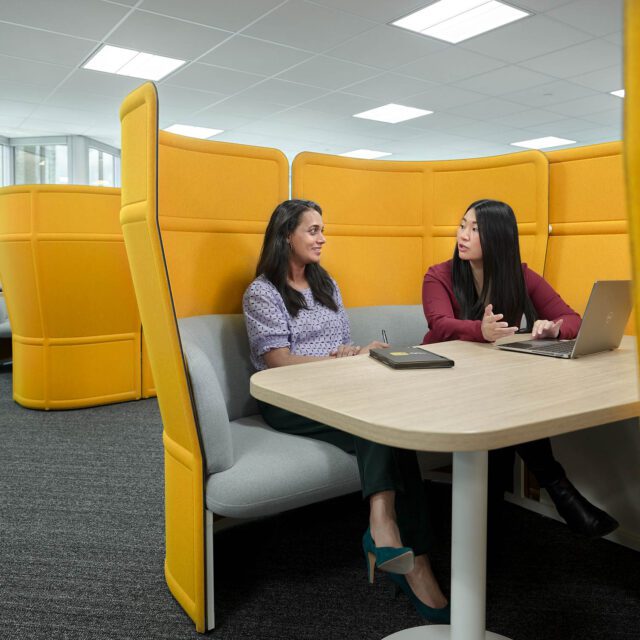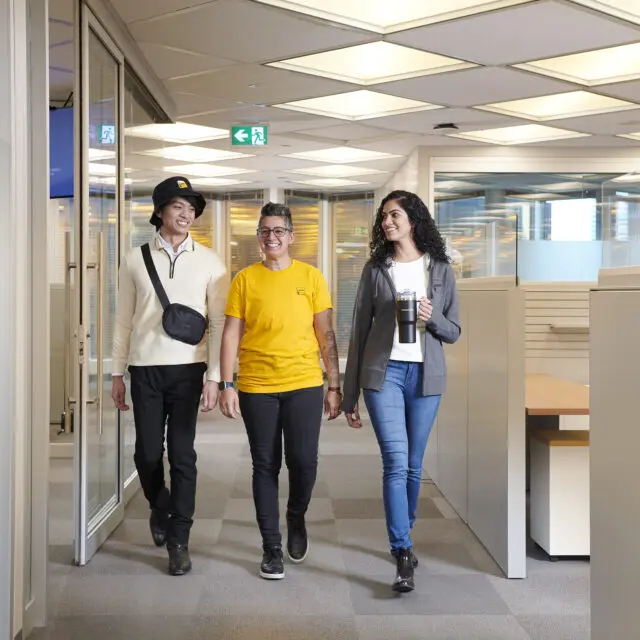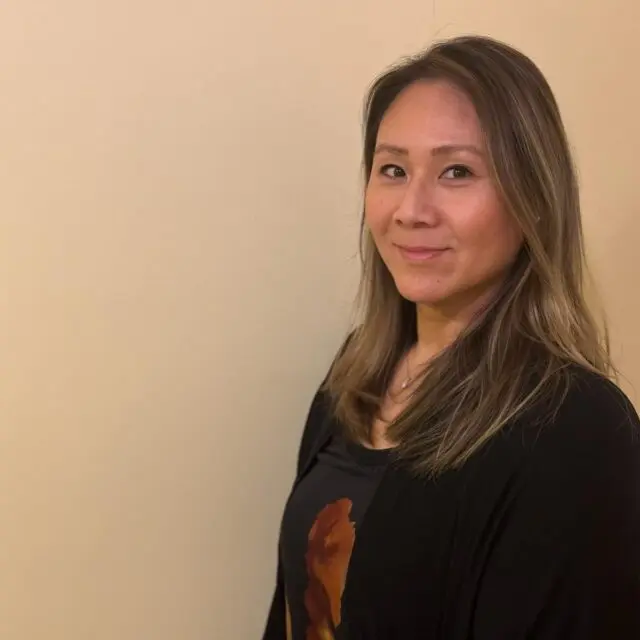Tell us about yourself.
My name is Sophia Dhrolia (she/they), and I am the Diversity & Inclusion Director at Interac. Here’s a fun fact about me: I like to make up random songs about random things happening in my life – I sing offkey, but it’s a lot of fun. Right now, my songs are about all the snacks my kids eat, but tomorrow it might be about my commute. It makes my kids laugh, which is my favourite sound. Some other fun facts: I started a book club to talk to others about the books I am reading, I recently took up skiing and love thrifting!
What is some of the work you do on a day-to-day basis?
As the lead for Diversity & Inclusion at Interac, I am always looking for ways to understand 1Interac and foster a culture of belonging. Right now, I am working on communications and events to acknowledge days of significance, aligning with our Black North Initiative pledge on the evolution of anti-racism training, and working with legal, security, and governance to implement a diversity dashboard. I’m actively looking at ways to ensure there are no barriers to progression and that we are representative of market labour availability data. I also work closely with our Sponsorships & Corporate Social Responsibility team (CSR) to connect employees with diverse community partners and to engage youth to break down systemic barriers to access. I love the work that I get to do because I know it drives long term sustainable change in systems, policies, and people.
What makes Interac a unique place to work?
It’s surprising how many things come to my mind in my very short time here, but I can definitely say it’s the culture. People truly care about each other here, and the executives are really invested in creating a people-centric organization where people matter. It’s a place where I feel like I belong in all aspects of my identity and where my time is valued. One of the best features that I started to enjoy Day 2 on the job are the Quiet Hours. For the first time in my career, I’m not stressed in the morning to rush my kids off to school, which makes both my kids and I much happier and we all end up having better days! I get to spend quality time with them rather than watching the clock to be at work by 9am on the dot. At Interac, I am trusted and enabled to do my work while also managing my life outside of work.
What does Mental Health Week mean to you?
I see the week as an opportunity for organizations to amplify their messaging and support for mental health, and for employees to remember to stop and rest. For example, Interac has incredible daily support like a free subscription to Headspace, fitness and yoga classes and daily Quiet Hours. On top of that, this year during Mental Health Week, all employees will have the opportunity to learn more about mental health benefits, participate in mindful meditation, in-office chair massages and general reminders to take care of ourselves. It’s always nice to have dedicated time in the year to remind ourselves why mental health is so important.
This year’s theme is #MyStory. Can you share a bit about your own personal story regarding mental health?
For over four years, I struggled with infertility and clinics had no answers for me other than the repeated disappointments month over month. When I started our journey to have our second child (my wife carried our first), I went in full of excitement and hope, with a realistic view that it would take some time – but not to the point of becoming a geriatric patient! I assumed I would have been successfully pregnant after a year, but after a couple of years and countless disappointments, I struggled deeply. I withdrew from my family and work and was depressed.
My wife found me a psychologist who specialized in infertility and mental health, and I had an incredible and supportive leader who made a world of a difference. My boss opened up to me about his own journey and I still remember crying together in the office afterwards. With his support, I took time off work, met with my doctor to speak about options for depression (e.g., medication, exercise, meditation, etc.), focused on myself and saw my therapist regularly. My boss checked on me regularly (with my permission) and eventually, with the support of my incredible network, I returned to work and started talking openly about my infertility.
I joined a support group, but admittedly always found it hard to connect with others as the spaces were designed for heterosexual couples. Nevertheless, their stories resonated with me and mine with them. I found the hardest part about infertility was the inability to describe an intangible loss and the constant feelings of failure. I continually questioned where I went wrong, what foods I ate as a child, etc. It was a vicious cycle in my mind, and that’s where therapy really helped me focus and to stop blaming myself.
In 2019, I was fortunate to experience pregnancy and carried our second child through reciprocal in-vitro fertilization. That’s a fancy way of saying that we were able to use my wife’s egg and our donor sperm. While I still have unexplained infertility and can joke that I believe my eggs are afraid of sperm, I still have random days wishing for a genetic link to my children, even though one looks like me and the other has my loud and extroverted personality! What I’ve come to learn is that it’s ok to have these feelings, that my mental health will fluctuate and that I need to be compassionate and honest with myself.
Are there any habits or resources you use to maintain positive mental health?
Yes! I think it’s so important to focus on my mental health as it allows me to show up in the present as a better human, parent, partner, co-worker etc. I started seeing a new therapist and see her monthly, I check-in with myself throughout the day and I am getting back into meditation. During the pandemic, I spent the first 10-minutes of everyday meditating, and I am working on getting back up to that.
How can workplaces support their employees’ mental health?
I think the best is to focus on daily support (like Quiet Hours), comprehensive mental health benefits and ensure employees are well-trained on mental health to reduce stigma and know how to access support. Ensure people leaders are equipped with the right tools and resources to support their team members and are trained to check-in on their teams regularly. For example, I recently completed a Workplace Mental Health Leadership Certificate Program at Interac which has equipped me with great tools and resources to support team members.
What advice do you have for someone who may be struggling with mental health and doesn’t know where to start?
I would contact our Interac employee and family assistance program (EFAP) and also speak to those closest to you, including your manager, if you feel comfortable. I know it’s hard and we can get caught up in our heads of what will people think. I found that most people responded with compassion and empathy and wanting to support me to optimal mental health. But some people also disappointed me along the way. I discovered that it was really important for me to advocate for my needs and ask for support.
What advice do you have for those looking to become better allies to those living with mental illnesses?
Most importantly, do not make assumptions. People with mental illness can still experience optimal mental health. If someone shares what they are going through, empathize rather than proselytize. Offer what you can, but most importantly, show up authentically. It’s easier for people to be authentic around you if you show up as YOU!




